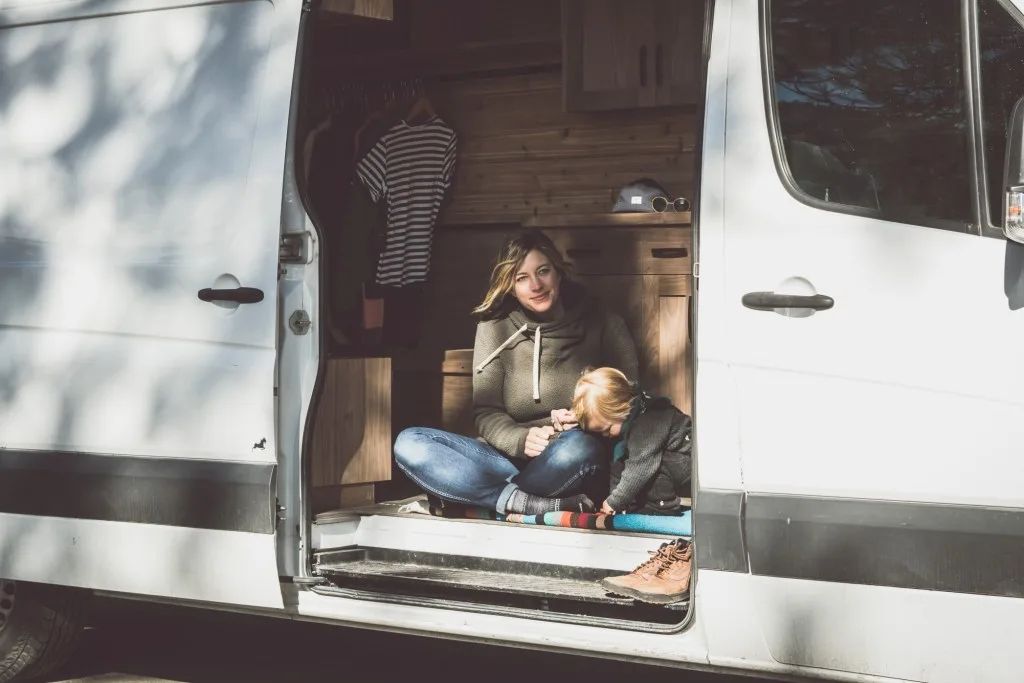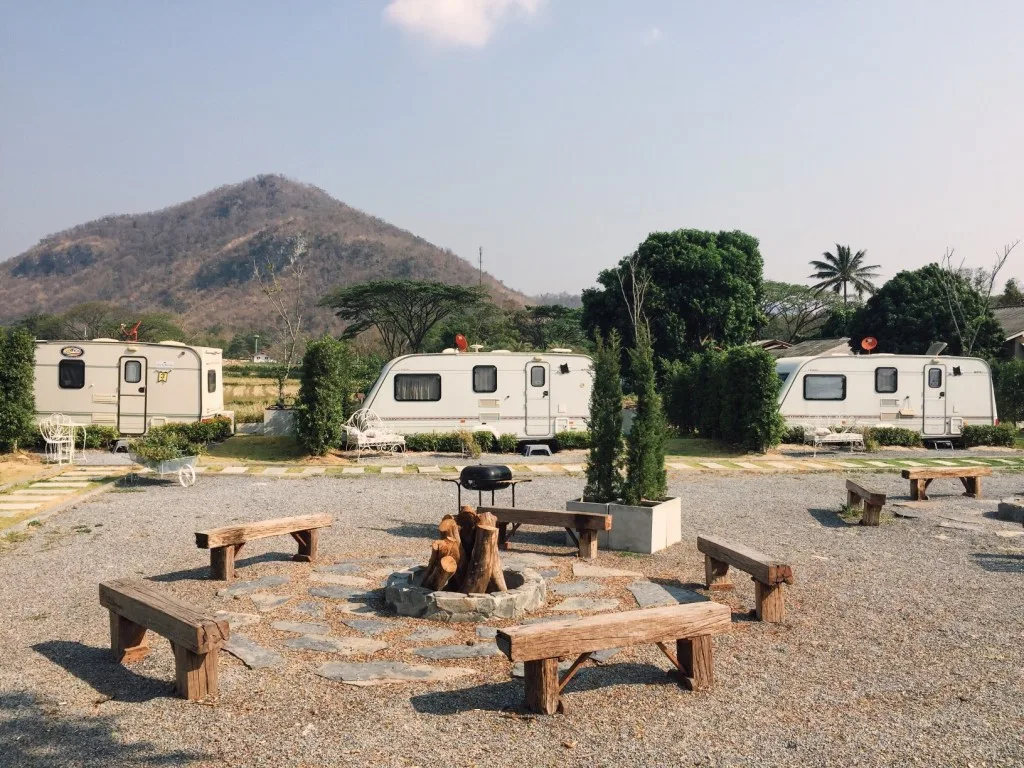We’ve all been there. We back into a campsite after dark, only to hear a loud “Scrrrape!” on the side of our RVs. Standing at the dump station with a confused look on our faces, we realize the sewer hose is not connected – after we open the black tank valve. Or, we pulled our big rig away from the gas pump, not quite clearing the island. Even calling a park to make a reservation without knowing the length of our RV is a rookie mistake.
Many hardcore RVers enjoy poking fun at first-timers, secretly hiding that they, too, have learned the ropes the hard way. We have suggestions that should help any new RVer avoid the laughter, cringing, and frustrations of jumping into the RV lifestyle.
What Is an RVer?
A loose definition of an RVer is anyone who camps in a recreational vehicle. That RV may range from a pop-up camper to a huge bus or anything in between.
Most would agree that an RV fits into the following designated classes: Class A (bus), Class B (camper van), Class C (bed over cab), and Class E (all-electric RVs). That also includes travel trailers, pop-up campers, and truck campers.
The only person who camps that would not be considered an RVer is a tent camper. That’s mainly because they’re not mobile and don’t have indoor amenities.
Don’t Commit These Terrible “New RVer” Traits
First-time RVers are usually not too hard to spot, as most are a little nervous but excited to get their new recreational vehicle out on the road and dive into “RVing.”
They may have had this dream for quite some time, so it’s easy to see how the details of running a campsite might slip their minds. In case you’ve forgotten what it was like to be a new RVer, here are a few signs:
Problems at the Dump Station
Dumping the tanks, whether at a sewer hookup or the dump station, is a foreign process to many. So the confusion between freshwater and sewer hoses and gate valves and slinkies is understandable.
Rule #1: Attach the sewer hose to both your vehicle and the sewer intake hookup before opening the black tank gate valve! Don’t be a Cousin Eddie!
Pro Tip: Avoid looking like a dump station novice by avoiding these 7 Deadly Sins of Dump Stations.

Left Essential Tools at Home
Common tools most homeowners have in their toolkit should also be included on an RV equipment list. A hammer comes in handy when you have to jar your trailer hitch loose from your truck.
How can you loosen a tightly screwed water hose without a vise-grip wrench? That flashlight left in the junk drawer at home is looking pretty useful now while walking to the shower house after dark, isn’t it?
Their RV Is Unlevel
How does anyone sleep with their head below the level of their feet? Usually, it’s pretty obvious when an RV is not level. It’s either lurching uphill or going downhill, or it moves from one side to the other.
And for those with absorption refrigerators, being level is required to keep food cold and the family well-fed. So it is difficult to understand how a newbie RVer could overlook leveling their rig, at least for very long.
Getting Into a Campsite After Dark
Most campgrounds strongly suggest arrival times before darkness descends. But sometimes RVers just can’t get to their destination until later in the evening. That’s when the parking fun begins.
Many first-time RVers are also not experienced in parking their rigs, even during the daytime. So allowing them to back into a small campsite without help can be considered a form of torture, and yet, many seasoned RVers will watch from the sidelines as the newbies attempt it! (Maybe it’s time we stop laughing and start assisting them?)

What Do First Time RVers Need?
Many long-time RVers might disagree on some of the essentials that a first-timer might need as an RVer. Here’s a list of equipment that will make the introduction to camping much easier.
RV Accessories
When you first secure an RV, make sure your rig has equipment in good working condition. If not, you’ll need to purchase a new sewer hose (at least 10 feet long, but 20 feet) and a separate hose to clean the sewer hose.
Purchase a freshwater hose as well. It should be a different color than the hose used to clean the sewer hose and must be stored in a separate section of the RV.
You should also get a ‘slinky’ to keep the sewer hose off the ground, a pressure regulator to avoid high-pressure city lines, and a water filter for your freshwater line.
That should cover the minimal essentials for your water system.
When it comes to the electrical system, you will need a 30-amp or 50-watt extension cord based on your vehicle’s wiring. You’ll also need a dog bone and an adapter that will fit on a 50-amp cord. You can plug the cord into a 30-amp outlet and a surge protector to protect your rig at a power post. Get a good selection of replacement fuses, as well.
Depending upon the type of RV, you may need leveling blocks, chocks, and of course, a level to assure that your final position is good and flat. If you have stabilizers and a trailer tongue jack, jack pads are a good investment, especially when setting up camp on soft grass or sand.
Your RV interior can benefit from having toilet tank treatment available, as well as having cleaning supplies, paper towels, and toilet paper in stock. You will supplement your inventory once you’ve got a few camping trips under your belt.
Pro Tip: Be prepared with everything you need for your first RV trip with these 22 Best RV Accessories in 2022.

Apps to Find Campsites
Start your first camping excursion by planning ahead. Find your intended campsites before you get there by perusing several phone apps and websites. You’ll find that many campgrounds require reservations. Even those spots that are off the beaten path may be full by the time you arrive. Have backup sites in mind.
Check out websites like Campendium and FreeCampsites for everything from private campgrounds to boondocking campsites. Look at apps like iOverlander, Allstays, The Dyrt, Hipcamp, and RVParky for info on dispersed camping, as well as campgrounds, RV services, and contact information.
GPS
A GPS unit specifically tailored to RVs is enormously helpful in navigating through city streets, highways, and around the country.
You can program it to consider your rig’s measurements when planning a trip, helping you avoid low clearances, toll roads, and more.
How Do I Start RVing?
The very best teacher for new RVers is an ‘old’ RVer. Talk with those who have been hauling their rigs around the country and have a wide variety of experiences. They will not only tell you what essential skill to learn, but they can also share the joys of RV life. For any gaps in your RV education, there is always YouTube!
What mistakes did you make as a first-time RVer? Tell us in the comments!
Discover the Best Free Camping Across the USA
To be honest with you, we hate paying for camping. There are so many free campsites in America (with complete privacy).
You should give it a try!
As a matter of fact, these free campsites are yours. Every time you pay federal taxes, you’re contributing to these lands.
Become a FREE CAMPING INSIDER and join the 100,000 campers that love to score the best site!
We’ll send you the 50 Best Free Campsites in the USA (one per state). Access the list by submitting your email below: